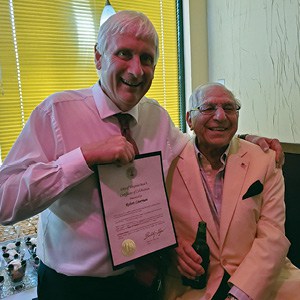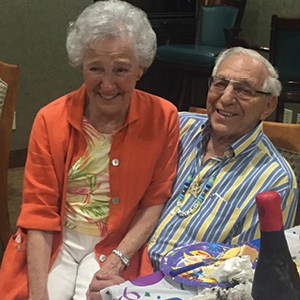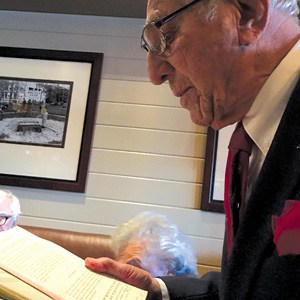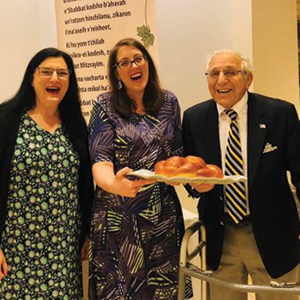Rabbi Rosalin Mandelberg, Cantor Jennifer Rueben, and Bob Liverman.
Ask anyone to describe Robert G. “Bob” Liverman, and it’s not long before you’ll hear the word “mensch.”
“He’s always doing good things for the Jewish people. He’s always been a mensch, a wonderful human being and Jew,” says his great-nephew Kirk Levy.
Liverman, who celebrated his 101st birthday with 50 friends and family at Imperial Palace on August 1, is the oldest contributor to the United Jewish Federation of Tidewater.
A few days earlier, on a steamy July day in Virginia Beach, he talked at his home about his ongoing commitment to the Jewish community—and to the community at large.
Typical of his modesty, Liverman suggests that others in the area likely have contributed to the UJFT over a longer time. Then, he recalls that he started giving in the early ’50s when he moved from Boston, Mass. with his wife Marcella Marks (of blessed memory) to her home town of Roanoke Rapids in North Carolina. “I’d collect money from others in the local Jewish community there and send it up here,” he says.

Virginia Beach Mayor Bobby Dyer presents Bob Liverman with a City proclamation.
Prior to moving, Liverman earned the rank of captain serving in the Air Corps during World War II. “I sat behind a desk in the U.S. for four years. I was very fortunate,” he says.
The couple then joined Marcella’s sister, Faye, to run her eponymously named upscale women’s clothing store. “Everyone knew Fannye’s. It was famous,” says Liverman, who went on regular buying trips to New York. Customers, including the wives of governors and congressmen from Virginia and North Carolina, came from hundreds of miles around to shop by appointment. The trio ran the store until 1995, when the Virginian-Pilot marked its closing with a story headlined, Fond Farewell to a Fashion Mecca.
In Roanoke Rapids, Liverman immersed himself in every aspect of community life—as a Mason, a Shriner, chair of a Red Cross chapter, and as volunteer chair of the housing authority among other endeavors. But most of all, he took the lead in the rural region’s Jewish life.

Betty Hecht and Bob Liverman.
The town had “three or four Jewish families, three were ours and then there was another,” says Liverman. His daughter Nancy Millstein recalls that their family, her aunt Fannye and grandmother Lena Liverman all lived on the same street as the shop, a few blocks apart. The Livermans joined with half a dozen families from nearby Weldon, along with scattered families from several other rural North Carolina communities, including Jackson, Henderson, and Emporia, to form a vibrant congregation and community. “It was a great place to grow up. Everyone knew your name and who you belonged to,” says Millstein.
When the dozen or so families pitched in to build a synagogue, Temple Emanu-El, dedicated as a Conservative congregation in Weldon in 1954, Liverman chaired the building committee and hired architect Charles Leavitt to transform a private home. Membership grew to around 28 households, peaking in the 1980s; then the demographics changed and when there was no one left to conduct services, it closed in the late ‘90s, not long after Bob and Marcella retired to Virginia Beach.
Leonard Rogoff, who detailed the community’s growth and decline in A History of Temple Emanu-El, (2007) described Liverman as “the catalyst” in bringing the community together.
“We had services every Friday night, 52 weeks a year, but there was no rabbi. One of the elders conducted the services,” says Liverman, who like most of those in the North Carolina congregation grew up in the Orthodox tradition. Finding the services not to his liking, he learned to chant all the Conservative melodies on his own. Liverman then stepped up as a lay leader of the congregation, a position he held for 35 years. “I’m a Leo. It’s my natural instinct to be a leader. I have some leadership qualities, I suppose.” he muses.
Liverman conducted funerals, unveilings, baby namings, annual community Seders for 50 to 100 people, and even the 1993 marriage of Sam and Bobbi Kittner. A resident of Washington D.C., the then-30-year-old Kittner was determined to return to his native Weldon, “Mayberry for Jews,” to celebrate his marriage. He researched and found that anyone in the Jewish faith can marry people if they recite seven prayers, so asking Liverman to officiate was “a no-brainer,” he says.

Bob Liverman.
It became increasingly difficult to recruit visiting rabbis to lead High Holiday services, says Liverman, so Temple Emanu-El started to work with the UAHC (now URJ), the Reform organization. He highlighted two occasions from this time. One was when their student rabbi officiant turned out to be none other than Jackie Mason, the comedian, fresh from working his routines in the Catskills. “Ours was the only congregation he ever served for the High Holidays. Everyone said he should have been a comedian,” Liverman quips. The other was when a last-minute cancellation left Liverman to lead the congregation on Yom Kippur. “I pored through the prayer book, I’m not that great a reader, but we had a beautiful Kol Nidre service. That was my main achievement,” he recalls.
In addition to his temple involvement, Liverman rose through the ranks of B’nai B’rith to become president of the Rocky Mount Lodge, and then the North Carolina state chairman. “It’s a brotherhood to support things Jewish. They have a voice and represent a lot of people,” he says.
Norfolk resident Bill Kittner, Sam’s uncle, who also grew up in Weldon, counted Liverman as his mentor. “He was a leader and a goodwill ambassador for the Jewish community. He did many mitzvahs,” he says. Together, they worked on many projects, including securing the move of the stained-glass windows from Temple Emanu-El to the chapel at the Beth Sholom Home in Virginia Beach, where they led the dedication procession in 2005.
After closing Fannye’s, Bob and Marcella moved to Virginia Beach, where her family had always maintained a holiday home. Marcella, “a sweetheart” and the love of his life, passed away soon after, in 1997. At the time, they were not affiliated with a congregation, but having become friends with Rabbi Larry Forman of Ohef Sholom on a mission trip to Israel, Forman readily agreed to officiate at her funeral. Liverman joined the congregation immediately thereafter and is now a 20-year OST member, a long-serving board member, and currently an honorary director. As the oldest, he has the honor of adjourning official meetings. Rabbi Roz Mandelberg notes that he’s a regular at services and “extremely beloved.”
In addition to attending services, twice-weekly yoga, a personal trainer, and a Monday night card game, Liverman maintains his community involvement through regular contributions to the Religious Education Relief Fund and the Floral Fund at OST, along with a slew of other charities.
“After years of giving, some people say, ‘we’ve done our part,’ but not Uncle Bob,” says his great-niece Amy Levy, who also happens to be president of United Jewish Federation of Tidewater. “He represents something remarkable—that giving doesn’t have to end. His love of community has never waivered.
“And, I know he’s proud to call himself a donor to our campaign,” says Levy.
In all, several arts groups and more than 40 charitable organizations benefit from Liverman’s largesse each year. He particularly favors cancer research having lost both Marcella and his second wife, Anna Lee Vaughan, to the disease.
“I attribute my long life to two beautiful women. Marriage was good to me. I had two happy ones,” he says, adding that he now enjoys the company of a wonderful lady friend, Betty Hecht.
“He’s accustomed to being around women—in business and at home. He’s a romantic at heart. He loves to be in love,” says daughter Betty Moritz, who lives close by. Among Moritz’ favorite activities is sharing UNC-Chapel Hill basketball games with her father.
After spending four decades and his working life in North Carolina, the Boston University alum and avid college sports fan is a self-described Tarheel. Liverman’s particularly proud of the scholarship his grandchildren established, with contributions from family and friends, for his 90th birthday, to support the attendance of two underprivileged boys from Roanoke Rapids at the university’s annual Roy Williams Basketball Camp.
In all, Liverman has five grandchildren and 11 biological great-grandchildren. “They’re all very devoted and I love them all,” he says. While none live locally, he has regular contact with his daughters and his younger sister, Helene Bernstein (100 on August 20), who lives in the same building and serves him dinner every night.
“It has been great celebrating. Now he’s working on his 102nd. He can’t believe he’s the oldest one contributing (to the UJFT). He’s very fortunate to be well enough, to have the means and still be caring,” says daughter Nancy Millstein. “He’s very charitable. We didn’t always have a lot, but we were taught to give of ourselves in community work. He’s the patriarch in every way.” A mensch indeed!
Prue Salasky

